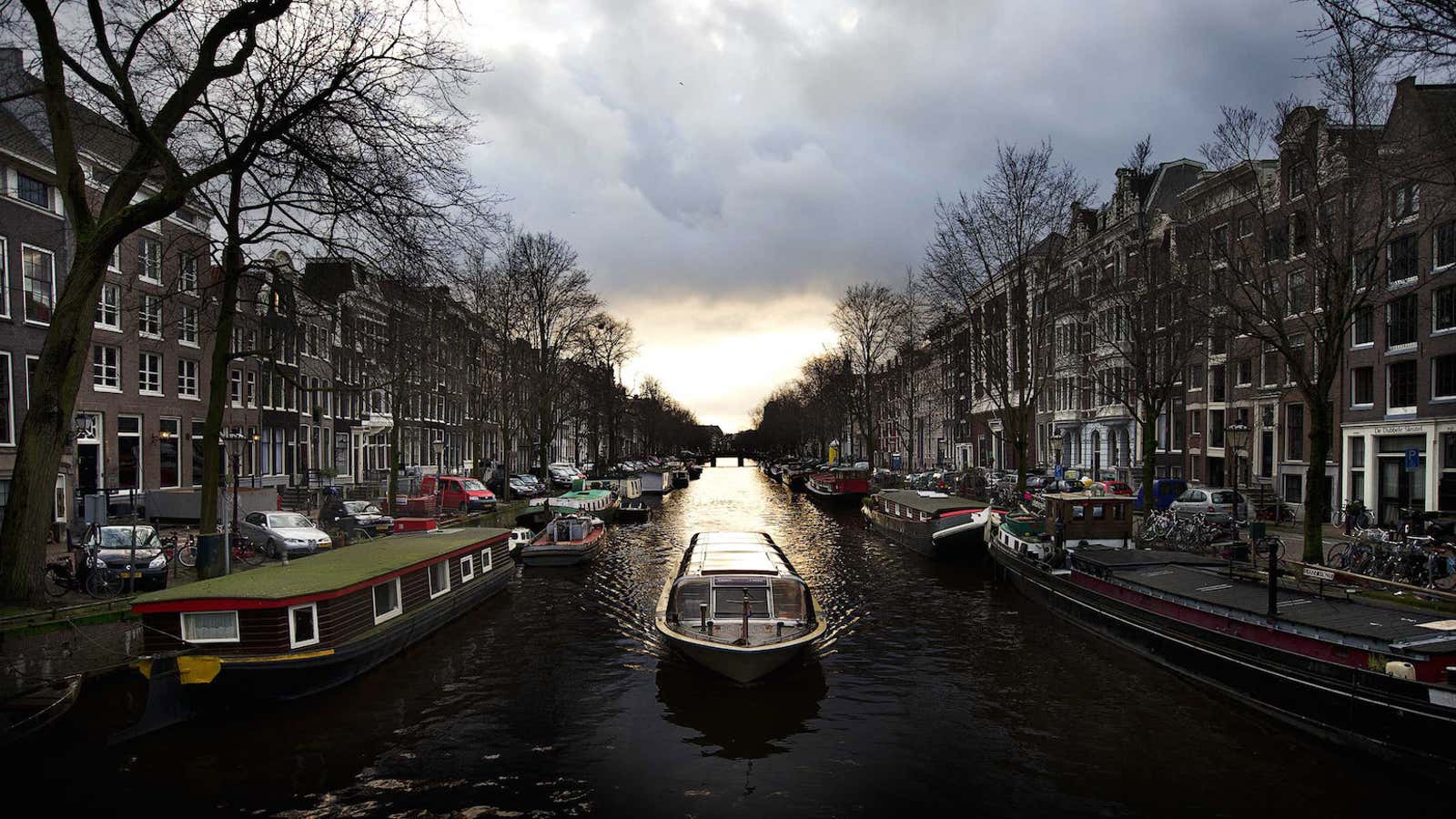When plotting to become the “Silicon Valley” of anything, it’s par for the course to draw parallels. Kajsa Ollongren, Amsterdam’s deputy mayor of economic affairs, likes to use her city’s position on the Atlantic to connect the metropolis with California’s famous Silicon Valley. This year, she declared Amsterdam the “startup capital of Europe’s west coast.”
In April, New York-based co-working company WeWork opened a branch in Amsterdam. Other US-based companies, including Uber, Netflix, Tesla, and Optimizely, have already set up international headquarters here. But Ollongren’s mission to lead Amsterdam to the top of Europe’s tech industry won’t be easy.
Competition is intense among European cities looking to attract the best money and startup talent, especially as US startups begin to expand internationally. Entrepreneurs regularly flock to Berlin to found their startups, attracted by flowing venture capital, the influence of Rocket Internet, and a vibrant creative scene. That is, if they haven’t already gone to London. Considering that the Netherlands raised only about $793 million in venture capital in 2014, while Germany and the UK raised $2.85 billion and $2.7 billion, respectively, the Dutch startup ecosystem can seem stunted.
After starting her term in the Amsterdam mayor’s office at the end of last year, Ollongren hit the ground running in 2015. In January, she rolled out StartupAmsterdam, an initiative designed to attract international IT talent and venture capital to Amsterdam over the next four years. With a €86 million (about $5.5 million) check from the city of Amsterdam and support from local companies and accelerators, like Booking.com, TomTom, and the Rockstart Accelerator, StartupAmsterdam is making Amsterdam’s transformation into a tech capital seem much more possible.
“A lot of what [Ollongren] is doing is creating awareness of what’s already there,” Boris Veldhuijzen van Zanten, cofounder of The Next Web Conference Europe, tells Quartz.
Veldhuijzen points to Amsterdam’s deep appreciation for its artists, an appreciation he believes fosters creativity in the tech industry. Incidentally, Ollongren has been supporting and promoting the local arts scene alongside her tech program. This isn’t a novel strategy. When former Berlin mayor Klaus Wowereit took office over a decade ago, he proclaimed, “Berlin ist arm, aber sexy,” (Berlin is poor but sexy). It was a bid to attract young, creative people to live and work in Berlin, and it worked.
When Veldhuijzen and Ollongren first met last year, Veldhuijzen says he cautioned her against creating new policies to make Amsterdam more attractive to businesses.
“There have been politicians in the past who have said, ‘Oh, we’ve got to do everything now and start all of these new initiatives,’” says Veldhuijzen. But he sees Ollongren, whom he describes as “very ambitious,” successfully emphasizing Amsterdam’s long-established strengths, like its strong universities, near-native English speakers, and a world-class international airport.
“Amsterdam is an ideal location for us: the city makes it easy for us to attract global talent, already benefits from a truly international workforce, and is situated midway between Asia and North America time zones with great transport links,” an Uber spokesperson tells Quartz in an email.
And it’s not just about a cosmopolitan population and great logistics. “They come for the taxes,” says Luuk Strijbosch, WeWork Amsterdam’s community manager, alluding to the Netherlands’ low corporate tax regime.
Some of WeWork Amsterdam’s international clients are Frog, RocketInternet-backed Foodora, and Yelp. These international firms use WeWork’s office space in Amsterdam to nurture their Netherlands-based teams. All the same, the common places in WeWork’s Amsterdam offices were empty when I saw them, and Strijbosch lamented the lack of collaboration between startups in the building.
StartupAmsterdam’s funding from the city of Amsterdam still pales in comparison to London’s Tech City’s private-public backing of £60 million (about $94 million). Tech City’s clustered office space structure has played an important role in growing London’s tech industry. But even though no plans exist for a Tech City-like development in Amsterdam, the city’s compact and easy-to-navigate urban center may compensate for its fragmented office real estate.
At the end of June, Ollongren travelled to New York City to solidify a New York-Amsterdam partnership with Alicia Glen, NYC’s deputy mayor for housing and economic development. The partnership aims to make Amsterdam a gateway to Europe for NYC startups, while New York would facilitate US expansions for Amsterdam businesses through specialized boot camps.
The alliance would foster growth in both the tech and creative industries, but it is still in its nascent phase.
“The meeting with Deputy Mayor Ollongren reaffirmed the strong historical, cultural and economic ties between New York City and Amsterdam,” Glen said in statement. “It sets the stage for a new chapter to this successful story.”
Even if the startups from this deal don’t exactly come flooding into Amsterdam right away, Ollongren has made it clear that she’ll come to them.
